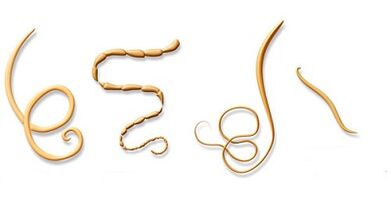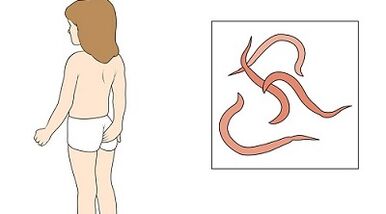In order to recognize the symptoms in time and successfully treat the parasites in the human body, patients need to consult a doctor in the early stages of illness.
Currently, about 300 kinds of microorganisms can successfully exist in the internal organs of the human body.
The main way of parasite infection is through dirty hands, objects and food.
Invasive diseases can be treated with medicine and traditional medicine; in severe cases, surgery may be required.
The main parasites in the human body
The parasites in the human body have penetrated into the internal environment, feeding on nutrients provided by food or organs and tissues.
In the future, the lack of trace elements and macro elements, minerals and vitamins will cause various diseases in the work of all systems and organs of patients.
The main way of infection:
- Oral stool-Parasites enter the human body after eating contaminated food and water;
- Contact with the family-After contact with infected objects or animals, larvae and worm eggs will infiltrate the human body because hands are not washed;
- Through the skin-The larva of the parasite penetrates the skin or is bitten by an insect vector.

There are several types of worms:
- round;
- tape;
- subcutaneous;
- Liar;
- Fabric.
Worms are the most widespread and widespread. It includes roundworms, pinworms, whipworms, toxoplasma and worms.
After the parasites eat contaminated food: fruits and vegetables instead of heat-treated meat, they enter the body through unclean hands or mouth. The worms settle in the patient's gastrointestinal tract.
Tape parasites include cattle and pork worms, broad worms and Echinococcus worms. The worms in this group are large. For example, tape worms can reach 25 m in length.
The tapeworm can feed on any tissue and liquid in the human body. The source of these parasites is cooked meat and fish.
The next one is subcutaneous worm. They are most common in foreign countries: Africa, India, Iraq, etc.
There are signs of parasites in the human body-tissues that move under the skin, causing severe pain.
Infections in infected patients are carried out by biting flies, mosquitoes or bed bugs (that is, blood-sucking insects).
Flukes (fluke)-liver fluke (fluke or fasciola), schistosome, fascilopsis.
Parasites live in human liver, pancreas, biliary tract and intestines.
The patient is infected with unboiled water, milk, unpasteurized cheese, under-processed meat and fish.
Human tissue parasites include Trypanosoma, Finn, Myospora and Microsporidia. This group of worms inhabit the human lungs, spinal cord, brain, and muscle tissue.
The carriers of parasites are wild animals and domestic animals: horses, pigs, chickens and other animals. Tissue worms are transmitted to humans through cooked meat.
Symptoms of parasitic diseases
The symptoms and treatment of human worms will vary, depending on the type of worm.
The parasite has fully adapted to the inside of the human organ, turning it into a home.
People may never notice the presence of worms, but parasitic infestation can exacerbate chronic diseases in adults and children. Usually, these signs indicate that the parasite has penetrated the human body.
Worms and other parasites (protozoa or insects) feed on and reproduce in the human body.
They can infect the eyes, skin, hair and internal organs of patients. And only persistent fatigue, lethargy or obesity indicate that the patient is a carrier of the parasite.

A patient has the following symptoms of parasitic infection:
- Anemia does not respond to treatment;
- Weaknesses;
- Unreasonable hunger;
- The sharp change of body weight in one direction or the other;
- Headache of unknown cause;
- Constipation followed by diarrhea;
- Signs of irritable bowel;
- The heaviness of the liver area;
- Joint and muscle pain;
- Skin manifestations (rash, neurodermatitis, etc. );
- Reduced immunity;
- Depression and neurosis;
- Insomnia.
During the examination of the patient, the doctor will visually inspect the skin.
The signs of the presence of parasites in the human body are skin rash, acne, paleness, sweating, early wrinkles, cracks, peeling and brittle nails. These symptoms usually indicate the presence of parasites in the patient's gastrointestinal tract.
If a child is infected with a pinworm, the signs of the parasite in the body are as follows-unbearable itching in the anal area.
Because the parasites in the child absorbed all the substances essential for development, the patient lacked growth, underdeveloped auricles, shortened fingers and hair loss.
Due to the presence of worms in the human stomach and other digestive organs, the mucous membranes are inflamed and a large white coating is formed on the tongue. Such patients must follow the diet table.
At the end of the examination, the doctor will analyze the overall condition of the patient's entire body to identify the performance of the pathogenic factors.
For example, parasites in women show their presence in the following ways: the patient has general malaise, sore lower back, irregular menstruation, and inflammation of the bladder and kidneys. Men will develop prostatitis and impotence.
Medications
Parasites are deposited in the human lungs, intestines, muscles and other internal organs. In children, the symptoms of the disease are almost the same as those of adult patients.
In order to treat the parasites in the human body as effectively as possible, the doctor must collect a complete medical history, including a description of the symptoms and examination methods. During treatment, special diets are assigned to patients.
Before prescribing anthelmintics for the patient, a number of checks were performed:
- Analyze the feces of worm eggs;
- Common procedures for histology;
- Serum blood test;
- Blood scan.
Several medicines can be used to kill parasites in children and adults.
Every anthelmintic is designed to destroy certain worms in the human body.
Special antiparasitic drugs should be prescribed to patients only when the expected benefits outweigh the potential harm of the treatment.
Patients should not choose anti-helminth drugs and self-medicate without consulting a doctor, because this group of drugs is very toxic to the human body. In addition, when treating parasites, a diet should be prescribed for the patient.
Traditional methods of fighting parasites
Some folk remedies have deworming effect, so the destruction of parasites at home is dependent on their help.
However, patients should consult a doctor before starting treatment, because diets containing certain plants are dangerous for certain chronic diseases.
Among the common methods to eliminate parasites in patients, the following is the most effective:
- in the human pinwormgarlic tinctureTo prepare the enema, you need to knead 10 cloves of garlic, pour in a glass of boiled water, and leave it for several hours;
- Pumpkin seedsis a simple way to kill tapeworms in the intestines of patients. For fasting treatment, take two tablespoons of peeled seeds;
- Onion extract-Used to fight against a bug and pin bug in the human body. Pour half a jar of chopped onions into a 40% ethanol solution and keep it in the dark for a week. Then filter and take 1 tablespoon. Spoon half an hour before meals. Only adults and non-alcoholic patients can receive infusion therapy;
- Walnut soup-This therapy is used for roundworms in the human body. Crush the unripe fruits, pour in boiling water, and infuse them overnight. Then they drink in batches every day.
According to the recommendations of traditional medicine, you can remove worms from your body by burning spicy food.
However, because they have a stimulating effect on mucous membranes, they should be used in moderation to prevent parasite infections in patients.
Pepper, ginger, mustard, garlic, onion, horseradish and cloves have obvious burning characteristics, which is unacceptable for human intestinal worms. Wormwood is often used in anti-worm herbs.
Pharmacies provide many drugs to kill human parasites, but many of them have side effects and affect health.
Not all drugs used to eliminate worms in the human body are allowed to be used by pregnant women and children.
Preventive measures to prevent parasite infestation
Preventive measures are the most effective way to prevent human parasites. Since childhood, everyone was taught to wash their hands in flower beds, toilets or after walking in the street, because the soil and dust contain worm eggs.
Before traveling to a foreign country at the equatorial latitude, people should be vaccinated with all the necessary vaccines to avoid infection with worms.
Following simple prevention rules, anyone can successfully protect themselves from possible parasite infections.
Personal hygiene rules:
- Wash your hands thoroughly and clean the space of your nails regularly-you must work in sand and soil, after going to the toilet, communicating with animals and before eating;
- The nails are best cut short, because the parasite eggs will accumulate under the nails;
- Vegetables, berries, fruits and other fruits and herbs should be washed for a long time under running water. This will ensure that all worm eggs are washed off the surface.
- Meat and fish should be fully heat-treated. Bloody meat may pose a threat to human health because it may contain eggs and parasite larvae.
- Do not drink unboiled water from wells and springs, as it may contain parasites;
- Only boil water and milk to kill the worms;
- Pasteurized lactic acid products should be consumed. Raw cheese can contain eggs and parasite larvae.
Experts recommend that you regularly screen the human body for parasites.
Do not use any anti-worm medicine as a preventive parasite for internal organs because they have toxic effects.
Any form of self-medication for parasites in the human body may be harmful to health. If you have pets in your home, they should be dewormed regularly.
Preventing parasites in the human body can help avoid many dangerous worms.
Observing the basic rules of personal hygiene can protect all family members, because human helminthiasis is one of the most unpleasant parasitic diseases that destroys all systems and internal organ functions.

























